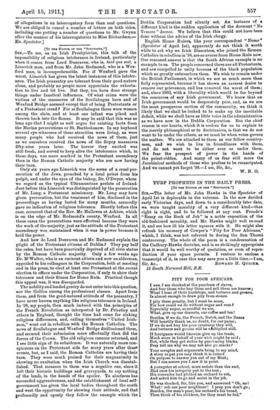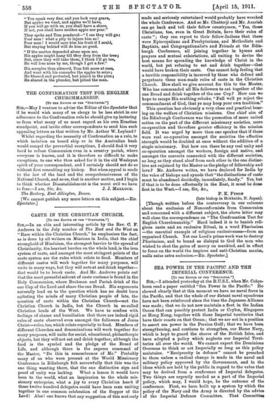TURF PROPHETS IN THE DAILY PRESS.
[To THE EDITOR Or THE " SPECTITOR.1
Six,—The letter of Mr. John Hawke in the Spectator of April 1st is deplorable in the extreme. In the now derided early Victorian days, and down to a considerably later date, we were taught morality of a very different kind—that right is right, and to be followed at any cost. Froude's "Essay on the Book of Job" is a noble exposition of the old-fashioned morality, and Mr. Hawke might well re-read it, and see how ill his letter squares with it. He might also refresh his memory of Cowper's " Pity for Poor Africans," which, I think, was not referred to during the San Thome controversy. The whole of the poem is a condemnation of the Cadbury-Hawke doctrine, and is so strikingly appropriate that it would be well worthy of quotation, or even of repro- duction if your space permits. I venture to enclose a transcript of it, in case this may save you a little time.—I am,
Sir, &c., EDWARD H. QUICK& 13 South Norwood Hill, S.E;
PITY FOR POOR AFRICANS.
I own I am shocked at the purchase of slaves,
And fear those who buy them and sell them are knaves ; What I hear of their hardships, and tortures and groans, Is almost enough to draw pity from stones.
I pity them greatly, but I must be mum,
For how could we do without sugar and rum P Especially sugar, so needful we see, What, give up our desserts, our coffee and tea!
Besides, if we do, the French, Dutch, and the Danes Will heartily thank us, no doubt, for our pains ; If we do not buy the poor creaturns they will, And tortures and groans will be ntiltiplied
If foreigners would likewise give up the trade, Much more in behalf of your wish might be said ; But, while they get riches by purchasing blacks, Pray tell me why we may not also go snacks ?
Your scruples and arguments bring to my mind, A story so pat you may think it is coined On purpose to answer you out of my Mint ; But I can assure you I saw it in print.
A youngster at school, more sedate than the rest, Had once his integrity put to the test ; His comrades had plotted an orchard to rob, And asked him to go and assist in the job.
He was shocked, Sir, like you, and answered " Oh, no ! What! rob our poor neighbour ! I pray you don't go; Besides, the man's poor, his orchard's his bread, Then think of his children, for they must be fed." "You speak very fine; and you look very grave, But apples we want, and apples we'll have, If you will go with us, you shall have a share, If not, you shall have neither apple nor pear."
They spoke and Tom pondered—" I see they will go Poor man ! what a pity to injure him so Poor man ! I would save him his fruit if I could, But staying behind will do him no good.
"If the matter depended alone upon me, His apples might hang till they drop from the tree; But, since they will take them, I think I'll go too, He will lose none by me, though I get a few."
His scruples thus silenced, Tom felt more at ease, And went with his comrades the apples to seize; Ho blamed and protested, but joined in the plan; He shared in the plunder, but pitied the man.





































 Previous page
Previous page